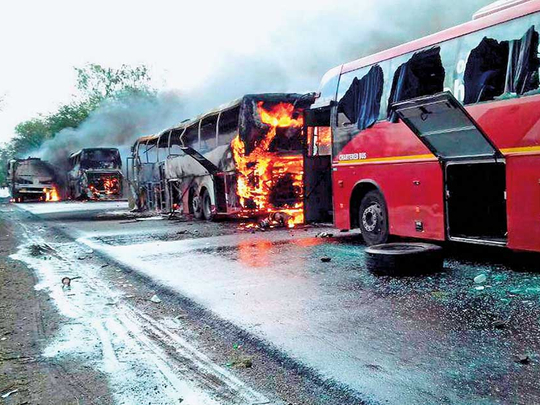
Mumbai: Even as the ongoing farmers’ agitation refuses to die down, a 45-year-old cultivator in a village in Solapur district committed suicide leaving a note that he should not be cremated till the chief minister visits his home and fulfils their demands.
He is among several farmers who have committed suicide during the last week when farmers took to the streets to protest and stop supplies of vegetables, fruits and milk going to the cities.
In his note, he wrote: “I am a farmer, Dhanaji Chandrakant Jadhav. I am committing suicide today. Please take my body to the village and do not cremate me till Chief Minister Devendra Fadnavis comes here.”. The suicide and the note has left the government in yet another problematic situation. Solapur’ guardian minister Vijay Deshmukh paid a visit to the village Thursday and gave assurances of assistance to the family — the deceased’s wife, and two children. The farmer owned 2.5 acres of land and had a debt of around Rs60,000, apart from taking loans from private lenders.
During the weeklong agitation, farmers demanded a complete loan waiver, implementation of the recommendations of the Swaminathan Committee that would improve farmers’ economic status as well their life in general, an increase in the price of procurement of milk and pension scheme.
Last Saturday, the government announced a farm loan waiver of Rs300 billion to marginalised farmers but it has created a division among farm leaders.
At a meeting held in Nashik, Communist leader Ajit Navale, along with Raju Shetti, head of Swabhiman Shetkari Sanghatna (a farmers’ party), other political leaders Jayant Patil, MLA Bachhu Kadu and Raghunath Patil, a farmers’ leader, gave an ultimatum to the government until June 12 to implement all their demands. If the government failed, there would be protests at all district headquarters on June 12 followed by ‘rail roko’ across Maharashtra on June 13.
Meanwhile, the shortage created by the protests in Mumbai and other cities eased and rocketing prices of farm produce have come down. But it appears this is just a temporary lull for the next four days.
Meanwhile, in Madhya Pradesh, farmers stepped up their agitation late on Wednesday after six were shot dead in clashes the previous day, forcing the authorities to impose a curfew in some areas.
The outburst of discontent in Madhya Pradesh and Maharashtra poses a challenge for Prime Minister Narendra Modi, who has promised to double farmers’ incomes over the next five years.
Farmers’ leaders say the six were shot dead by police during a protest in the central city of Mandsaur, a version questioned by the state government which has ordered an investigation.
“We will continue our protest until the government accepts our demands,” said Sunil Gaur of the Rashtriya Kisan Mazdoor Sangh, or National Farm Workers’ Union, which called Wednesday’s statewide shutdown.
“The government has complicated the situation by killing six innocent farmers.” Farmers dumped vegetables and milk on the roads when the strike kicked off last week, demanding billions of dollars in debt forgiveness and better prices for their produce.
Tension persisted in some parts of Madhya Pradesh, with a curfew imposed throughout the district of Mandsaur where the farmers died, a police officer said.
“The curfew won’t be lifted until the situation becomes normal,” said the officer, D. Kavita.
Madhya Pradesh Chief Minister Shivraj Singh Chauhan appealed to farmers to keep the peace and accused the opposition Congress party of being behind violence that broke out at the protests.
“The government is with the farmers,” he told television news agency ANI, a Reuters affiliate. “Some people want to ruin the atmosphere. Stay away from such people.” Congress Vice-President Rahul Gandhi was expected to visit Mandsaur on Wednesday. “This government is at war with the farmers of our country,” he said on social network Twitter.
In the past, ruling parties have lost elections in the eastern state of West Bengal, western Maharashtra and the northern state of Uttar Pradesh after farmers died at the hands of security forces.
The Maharashtra farmers’ strike entered its seventh day, despite an assurance from Chief Minister Devendra Fadnavis that the state would waive distressed farmers’ debts before Oct. 31.
The prices of fresh produce have more than doubled in cities such as Mumbai, India’s main financial centre and the capital of Maharashtra.
Two-thirds of India’s population of 1.3 billion depend on farming for their livelihood, but the sector makes up just 14 per cent of gross domestic product, reflecting a growing divide between the countryside and increasingly well-off cities.












